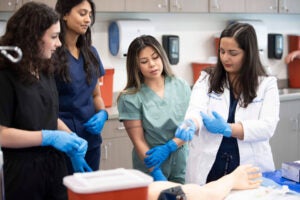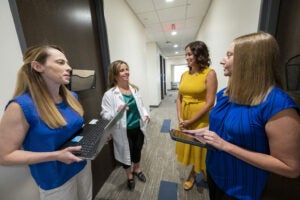Didactic Year (Year 1)
Spring Term
- Introduction to the PA Profession
- Human Anatomy and Lab
- Health Policy
- Interpreting and Evaluating the Medical Literature
- Introduction to Clinical Medicine
- Medical Physiology and Pathophysiology
- First Immersion
Summer Term
- Genetic and Molecular Mechanisms of Health and Disease
- Patient Education and Counseling
- History Taking and Physical Examination 1 and Lab
- Clinical Medicine 1 and Lab
- Diagnostic & Therapeutic Procedures in Medicine 1 and Lab
- Pharmacology 1
Fall Term
- History Taking and Physical Examination 2 and Lab
- Clinical Medicine 2 and Lab
- Diagnostic and Therapeutic Procedures in Medicine 2 and Lab
- Pharmacology 2
- Health Issues Across the Lifespan
- Fundamentals of Surgery
- Second Immersion
All didactic courses are sequential and should be successfully completed in order to progress to the next term of the curriculum. Since each course in the program is offered only once during each academic year, any departure from completing a course in its planned sequence (e.g. failure to receive a passing grade of ‘C’ or better, leave of absence from the program) may result in a delay which may require retaking the course the following year, as well as delays in completing the program.
Clinical Year (Year 2)
Students who are not located in an area near available clinical sites may need to relocate in order to complete the program. Keep in mind the program clinical education team works with students to avoid or minimize this to the best of our ability. Per program policy, prospective and enrolled students are never required to provide or solicit clinical sites or preceptors.
The order in which a student completes all of the below clinical courses may vary, so course numbers are not listed by discipline.
Learn more about the Supervised Clinical Practice Experiences and background check requirements.
Supervised Clinical Practice Experiences Schedule
Spring Term
- Supervised Clinical Practice Experience 1
- Supervised Clinical Practice Experience 2
- Supervised Clinical Practice Experience 3
Summer Term
- Supervised Clinical Practice Experience 4
- Supervised Clinical Practice Experience 5
- Supervised Clinical Practice Experience 6
Fall Term
- Supervised Clinical Practice Experience 7
- Supervised Clinical Practice Experience 8
- Transition To Professional Practice
Transition to Professional Practice
The Transition to Professional Practice course combines instruction and immersive learning opportunities on practical issues as they relate to the practicing PA, especially the new graduates, with evaluation instruments that measure if and verify that the learner has met the learning outcomes of the program and has the knowledge, interpersonal skills, clinical and technical skills, professional behaviors, clinical reasoning and problem-solving abilities required for PA practice. This course includes a summative assessment of each student that must occur within four months of their graduation.



